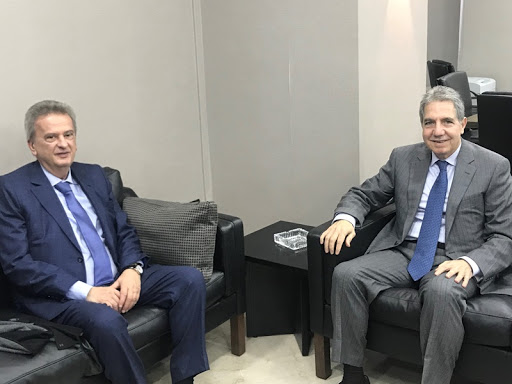The Lebanese pound fell sharply against the US dollar on Saturday, a day after the central bank issued a circular that it was launching a foreign exchange unit at BDL to centralize the price of dollars for money exchange houses a move that was understood to mean edging away from peg of the pound to the dollar.

The rate of exchange of one US dollar to the Lebanese pound reached 2,800-2,900 at money exchange houses on Saturday.
Central bank governor Riad Salameh issued two circulars Friday one of them that BDL was launching a foreign exchange unit to centralize the price of foreign currency, especially U.S. dollar, for money exchangers in light of a crunch liquidity crisis.
The second circular allowing small depositors to cash out and that deposits of $3,000 or less could be withdrawn in Lebanese pounds at “market” price.
It also permitted deposits of 5 million Lebanese pounds or less to be withdrawn.
While neither circular defined the “market” rate, analysts said it would likely reflect the parallel market, where the pound has traded around 2,800 pounds to the dollar, nearly 50% weaker than the official peg of 1,507.5 in place since 1997.
Finance Minister Ghazi Wazni who represents Amal Movement leader Speaker Nabih Berri in the cabinet hailed the central bank’s decision regarding small depositors which he said aims to protect their savings, al-Joumhouria daily reported on Saturday.
Banque du Liban circular is “a positive step aiming to protect the rights and funds of small depositors with accounts under 5 million Lebanese pounds and under 3,000 U.S. dollars,” said Wazni.
He said the parameters of BDL’s decision apply to %61.5 of accounts in Lebanese banks, totaling 1.725 million bank accounts, or roughly $5.175 billion in deposits
The Minister reiterated what Berri said on several occasions that the “money of depositors, especially the small depositors, are sacred and must be protected.”
Commenting on the development , one analyst told Ya Libnan; “Poor people in Lebanon have long withdrawn and spent whatever little money they held in the banks because of inflation, unemployment and poverty . The suspicious part here is the number of accounts , knowing that Lebanon is a country of around 4 million people and the average household size is 4 . ” He went on to say “I am very concerned that this could be the money of the elite politicians , who may have found with the help of Central Bank governor Riad Salameh a new way to rob the country.
Of course the big question here is how many $3 thousand accounts can each of the politicians have or control.
What adds to the suspicion is a report by Bloomberg , which says that clients holding accounts in Lebanese pounds equivalent to $3,000 can transfer the amount into foreign currency at the fixed rate of 1,515 pounds to a dollar, and then withdraw at the new market rate, so they aren’t at a disadvantage. In other words if the account is exactly 5 million LL then the depositor is supposed to get the equivalent of $3300 , then the depositor withdraws the funds at the market rate which is expected to be around 3000LL per US dollar or 9.9 LL million total or nearly double the money in LL
While if larger account holders now want to withdraw from their dollar account they can only get money in Lebanese funds at the rate of 1515 LL per US dollar In other words if they want to withdraw $3300 they will receive from the bank 4.99 million Lebanese pounds and if they need to convert to Dollars they have to buy it from the exchange house at 3000 LL per US dollar and end up with $1 666 or nearly half their money
“This is the hair cut they have been talking about for large depositors ” the analyst went on to say stressing that the 5 million LL accounts are are not owned by the poor , but by the elite Lebanese politicians of the Hezbollah backed government.
We don’t need to wait for too long to find out Salameh’s intention behind the circulars, but since trust in the government and in Salameh in particular is now at the lowest it has ever been we may never know the real truth before the government starts negotiating with the lenders after it defaulted on all its debt.
There is a huge concern in Lebanon that we are becoming another Venezuela , with too many exchange rates and too much uncertainty but without the oil revenue.

Leave a Reply
You must be logged in to post a comment.